
Faculty File
Faculty Honored with Professorships
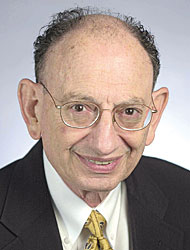 |
|
Jack Friedenthal
|
In January, the Law School named Jack Friedenthal as the Edward F. Howrey Professor of Trial Advocacy, Litigation, and Professional Responsibility and Charles Craver as the Freda H. Alverson Professor of Law.
Endowed in 1982, the Howrey Professorship is sponsored by its namesake and is awarded to a faculty member who teaches and writes on litigation and professional responsibility. Friedenthal previously served as dean of the Law School from 1988 to 1998. His teaching career began in 1958 at Stanford Law School, where he also was associate dean for academic affairs. He has been a special master in a number of federal cases including disputes between the National Football League and the Football Players Association, and has acted as a public and private consultant on matters of court procedure, employment discrimination, legal assistance programs, and foreign conflicts of laws.
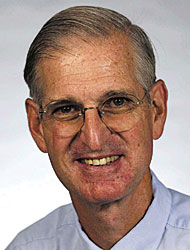 |
|
Charles Craver
|
Created in memory of its namesake, the Alverson Professorship was endowed in 1984. Craver taught at the University of Illinois, the University of California-Davis, the University of Virginia, and the University of Florida before joining GW Law. He practiced with Morrison & Foerster in San Francisco and clerked for Judge George MacKinnon of the U.S. Court of Appeals for the D.C. Circuit. He is the author or co-author of more than 10 books and numerous law review articles on various aspects of labor and employment law and dispute resolution.
Schechter Recognized with Pattishall Medal
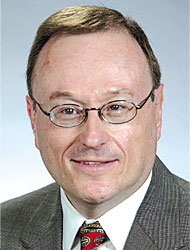 |
|
Roger Schecter
|
The Brand Names Education Foundation’s 2004 Pattishall Medal was awarded to Roger Schechter. The award was established in honor of Beverly W. Pattishall to recognize educators in the business and legal fields for outstanding instruction in the trademark and trade identity field. It is presented to the university or graduate school academic, nominated by his or her peers or students, who best exemplifies the qualities of excellence and innovation in teaching subjects broadly related to trademarks and trade identity.
Overton Wins Derrick Bell Award
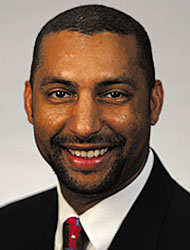 |
|
Spencer Overton
|
The Association of American Law Schools’ Section on Minority Groups presented the 2004 Derrick Bell Award to Spencer Overton. Via digital video conference, Overton was the opening speaker, at the U.S. State Department’s conference in the Philippines titled “Citizen Participation in the Electoral Process: Not Just a Vote.” He also was selected as a finalist in the Carnegie Scholars Program. Overton also made presentations at a Washington & Lee Law School Faculty workshop; a symposium at UNLV Law School; and to a delegation at the U.S. Embassy in Addis Ababa, Ethiopia, via digital videoconferencing. With Paul Butler, he worked with student groups to organize a lecture at GW Law given by Harvard Law School Professor Charles Ogletree on Brown v. Board of Education. In the aftermath of the U.S. Supreme Court’s campaign finance opinion in McConnell v. FEC, Overton served as a panelist and made presentations at numerous events, and his commentary on the matter was published in The Boston Globe two days after the Supreme Court’s opinion.
Professor Represents Vehicle Trade Associations before Supreme Court
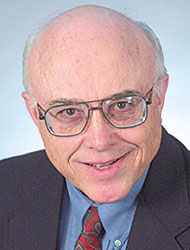 |
|
Arnold Reitze
|
Arnold Reitze, the Maurice C. Shapiro Professor of Environmental Law and director of the Environmental Law Program, was the counsel of record for the Alliance of Automobile Manufacturers, the American Petroleum Institute, and six other motor vehicle trade association amicus supporters of the petitioners in Engine Manufacturers v. South Coast Air Quality Management District before the U.S. Supreme Court. The issue concerned whether certain motor vehicle regulations issued by the SCAQMD were preempted by the CAA.
Reitze wrote the amicus petition for certiorari and, after it was granted, wrote the amicus brief for the industry with Stuart Drake and Eric Wolff of the Washington office of international firm Kirkland & Ellis.
In an eight to one decision written by Justice Antonin Scalia, the Court agreed with the position and reversed the decision of the Ninth Circuit.
Also of Note:
Cynthia Lee’s “But I Thought He Had a Gun: Race and Police Use of Deadly Force” is forthcoming in the Hastings Race and Poverty Law Journal. She also is preparing a new criminal law casebook with Angela Harris which will be published by West Publishing Company. Her Murder and the Reasonable Man (NYU Press, 2003) has been reviewed in the Harvard Law Review; the Northwestern School of Law’s Journal of Criminal Law & Criminology; The Chronicle of Higher Education; the ABA’s Criminal Justice magazine; The Women’s Review of Books; Legal Times; Asian Week; and The Champion, a legal magazine published by the National Association of Criminal Defense Lawyers. Additional reviews are forthcoming in The George Washington Law Review and the Ohio State Journal of Criminal Law.
From March to May, Jerome Barron served as the Fulbright Distinguished Chair in Law at the University of Trento, Italy.
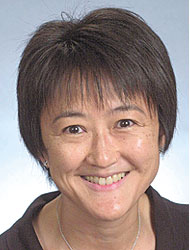 |
|
Carol Izumi
|
The Consumers Union nominating committee selected Carol Izumi to be a candidate on the ballot for the election to the board of directors. Thirteen people were nominated; seven will be elected. Subscribers to Consumer Reports magazine were sent ballots and the biographical sketches in early April and the election results will be known in late summer or early fall.
 |
|
Susan Jones
|
In February, Susan Jones was co-chair of the conference planning committee for the Opportunities for Community Economic Development Using New and Traditional Tools national conference, which was co-sponsored by the ABA Forum on Affordable Housing and Community Development Law, Business Law and Section on State and Local Government Law in Miami. There, she moderated a panel on “Community Development Corporations: Opportunities and Challenges.” In March, she was a discussion leader for a Conference on the Creation and Maintenance of, and Public Interest Advocacy by, Intellectual Property Law Clinics. Jones moderated the panel “New Markets Tax Credits: What’s Happening on the Ground” in April at the ABA Business Law spring meeting in Seattle and was a panelist for the third annual meeting of Law School Small Business (and other Transactional) Clinic Educators held at the University of Pennsylvania Law School. Jones was also chair of the planning committee of the upcoming AALS Clinical Teachers Workshop held in San Diego in May.
In December, Renée Lettow Lerner joined the Department of Justice as a deputy assistant attorney general in the Office of Legal Counsel. She will return to the Law School in 2005.
In February, Michael Matheson and Sean Murphy presented to attorneys of the U.S. Department of State Office of the Legal Adviser on “The Current Status of Customary International Law.” Along with Dinah Shelton, they spoke as part of a panel at the Law School on “International Law and the Trial of Saddam Hussein.” The panel was chaired by U.S. State Department assistant legal adviser and GW Law adjunct professor David Stewart. Also, Matheson was part of a panel on the role of the State Department legal adviser at the annual meeting of the American Society of International Law. He traveled to Geneva, Switzerland, in April to participate in the next session of the International Law Commission. He also gave presentations at the U.S. Navy Pacific Command legal conference in Honolulu on the trial of terrorists by military commissions, at the American Society of International Law on the diplomatic protection of investment, and at GW Law on the trial of Saddam Hussein and on legislative oversight of international military operations. Matheson was chair of a symposium on the legal implications of the Iraq war for the American Journal of International Law and participated in meetings of the executive council of the American Society of International Law and the State Department’s Public Advisory Committee on International Law.
In February, Tom Morgan testified before the House Financial Services Committee’s Subcommittee on Capital Markets on “The Role of Attorneys in Corporate Governance.” The subcommittee was exploring the effects of the Sarbanes-Oxley legislation on the conduct of corporate attorneys. He also participated on a panel at the American Bar Association midyear meeting on “The Lawyer-Lobbyist: What Legal and Ethical Rules Apply?” At the Capital University Law School, Morgan gave the 25th annual Sullivan Lecture in March as part of the school’s centennial
|
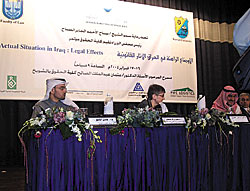
Associate Dean Susan L. Karamanian (center) joined academics from around the Middle East to discuss the future of Iraq at a conference at the University of Kuwait Faculty of Law in February. Karamanian spoke on the proposed new tribunal for the trial of Saddam Hussein. Photo by Paul Fucito
|
Andy Spanogle was appointed by the U.S. Department of Defense to a team of attorneys working for the (Iraqi) Coalition Provisional Authority Civil Code and to deBaathify, the Iraqi Commercial Code. His draft of a proposed Iraqi Secured Transactions Law was the one selected by the Coalition Provisional Authority for translation into Arabic and enactment by the Iraqi Governing Council. The proposed financial leasing law will also follow the model established in the secured transactions Law. In April, Spanogle was the featured speaker at a showcase program on International Business Transactions put on by the ABA’s Section on International Law at its spring meeting in New York. Both the attorneys seeking to exhume the remains of Billy the Kid and his mother, Katherine Antrim, and opposing attorneys cited James Starrs in their briefs as an authority on the subject. Starrs delivered the lecture, “Exhumation: Science and the Law,” to the Scientific Colloquium at the NASA/Goddard Space Flight Center in Greenbelt, Md., in February; “Understanding Suicide Notes” to the West Virginia Health Sciences Center in Morgantown, W.Va., in March; and “Exhumations of Human Remains: From Jesse James to John Wilkes Booth to Meriwether Lewis” to the University of Virginia School of Medicine in Char-lottesville, Va., in April. In February, he presented two papers at the 56th annual meeting of the American Academy of Forensic Sciences held in Dallas: “Forensic Science Movies: Reloaded,” and “Deep in the Heart of Texas—Justice.” Also at the American Academy’s meeting, Starrs served as chairman and moderator of the program of the “Last Word Society.”
In March, Joan Strand presented testimony for the Council for Court Excellence at a public hearing before the Judiciary Committee of the D.C. City Council. The testimony commented on two proposed bills, the Public Access to Juvenile Justice Amendment Act of 2004 and the Blue Ribbon Juvenile Justice and Youth Rehabilitation Act of 2004. Strand is spending her spring 2004 sabbatical as a visiting senior policy analyst at the Council for Court Excellence.